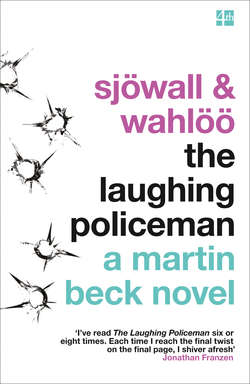Читать книгу The Laughing Policeman - Джонатан Франзен, Jonathan Franzen - Страница 7
1
ОглавлениеOn the evening of 13 November it was pouring in Stockholm. Martin Beck and Kollberg sat over a game of chess in the latter's flat not far from the underground station of Skärmarbrink in the southern suburbs. Both were off duty insomuch as nothing special had happened during the last few days.
Martin Beck was bad at chess but played all the same. Kollberg had a daughter who was just over two months old. On this particular evening he was forced to baby-sit, and Martin Beck on the other hand had no wish to go home before it was absolutely necessary. The weather was abominable. Driving curtains of rain swept over the rooftops, pattering against the windows, and the streets lay almost deserted; the few people to be seen evidently had urgent reasons to be out on such a night.
Outside the American embassy on Strandvägen and along the streets leading to it, 412 policemen were struggling with about twice as many demonstrators. The police were equipped with tear-gas bombs, pistols, whips, truncheons, cars, motorcycles, shortwave radios, battery megaphones, riot dogs and hysterical horses. The demonstrators were armed with a letter and cardboard signs, which grew more and more sodden in the pelting rain. It was difficult to regard them as a homogeneous group, for the crowd comprised every possible kind of person, from thirteen-year-old schoolgirls in jeans and duffel coats and dead-serious political students to agitators and professional trouble-makers, and at least one eighty-five-year-old woman artist with a beret and a blue silk umbrella. Some strong common motive had induced them to defy both the rain and whatever else was in store. The police, on the other hand, by no means comprised the force's élite. They had been mustered from every available precinct in town, but every policeman who knew a doctor or was good at dodging had managed to escape this unpleasant assignment. There remained those who knew what they were doing and liked it, and those who were considered cocky and who were far too young and inexperienced to try and get out of it; besides, they hadn't a clue as to what they were doing or why they were doing it. The horses reared up, chewing their bits, and the police fingered their holsters and made charge after charge with their truncheons. A small girl was bearing a sign with the memorable text: DO YOUR DUTY! KEEP FUCKING AND MAKE MORE POLICE! Three thirteen-stone patrolmen flung themselves at her, tore the sign to pieces and dragged her into a squad car, where they twisted her arms and pawed her breasts. She had turned thirteen on this very day and had not yet developed any.
Altogether more than fifty persons were seized. Many were bleeding. Some were celebrities, who were not above writing to the papers or complaining on the radio and television. At the sight of them, the sergeants on duty at the local police station had a fit of the shivers and showed them the door with apologetic smiles and stiff bows. Others were less well treated during the inevitable questioning. A mounted policeman had been hit on the head by an empty bottle and someone must have thrown it.
The operation was in the charge of a high-ranking police officer trained at a military school. He was considered an expert on keeping order and he regarded with satisfaction the utter chaos he had managed to achieve.
In the apartment at Skärmarbrink, Kollberg gathered up the chessmen, jumbled them into the wooden box and shut the sliding lid with a smack. His wife had come home from her evening course and gone straight to bed.
‘You'll never learn this,’ Kollberg said plaintively.
‘They say you need a special gift for it,’ Martin Beck replied gloomily. ‘Chess sense I think it's called.’
Kollberg changed the subject.
‘I bet there's a right to-do at Strandvägen this evening,’ he said.
‘I expect so. What's it all about?’
‘They were going to hand a letter over to the ambassador,’ Kollberg said. ‘A letter. Why don't they post it?’
‘It wouldn't cause so much fuss.’
‘No, but all the same, it's so stupid it makes you ashamed.’
‘Yes,’ Martin Beck agreed.
He had put on his hat and coat and was about to go. Kollberg got up quickly.
‘I'll come with you,’ he said.
‘Whatever for?’
‘Oh, to stroll around a little.’
‘In this weather?’
‘I like rain,’ Kollberg said, climbing into his dark-blue poplin coat.
‘Isn't it enough for me to have a cold?’ Martin Beck said.
Martin Beck and Kollberg were policemen. They belonged to the homicide squad. For the moment they had nothing special to do and could, with relatively clear consciences, consider themselves free.
Downtown no policemen were to be seen in the streets. The old lady outside the central station waited in vain for a beat officer to come up to her, salute, and smilingly help her across the street. A person who had just smashed the glass of a showcase with a brick had no need to worry that the rising and falling wail from a patrol car would suddenly interrupt his doings.
The police were busy.
A week earlier the police commissioner had said in a public statement that many of the regular duties of the police would have to be neglected because they were obliged to protect the American ambassador against letters and other things from people who disliked Lyndon Johnson and the war in Vietnam.
Detective Inspector Lennart Kollberg didn't like Lyndon Johnson and the war in Vietnam either, but he did like strolling about the city when it was raining.
At eleven o'clock in the evening it was still raining and the demonstration could be regarded as broken up.
At the same time eight murders and one attempted murder were committed in Stockholm.
